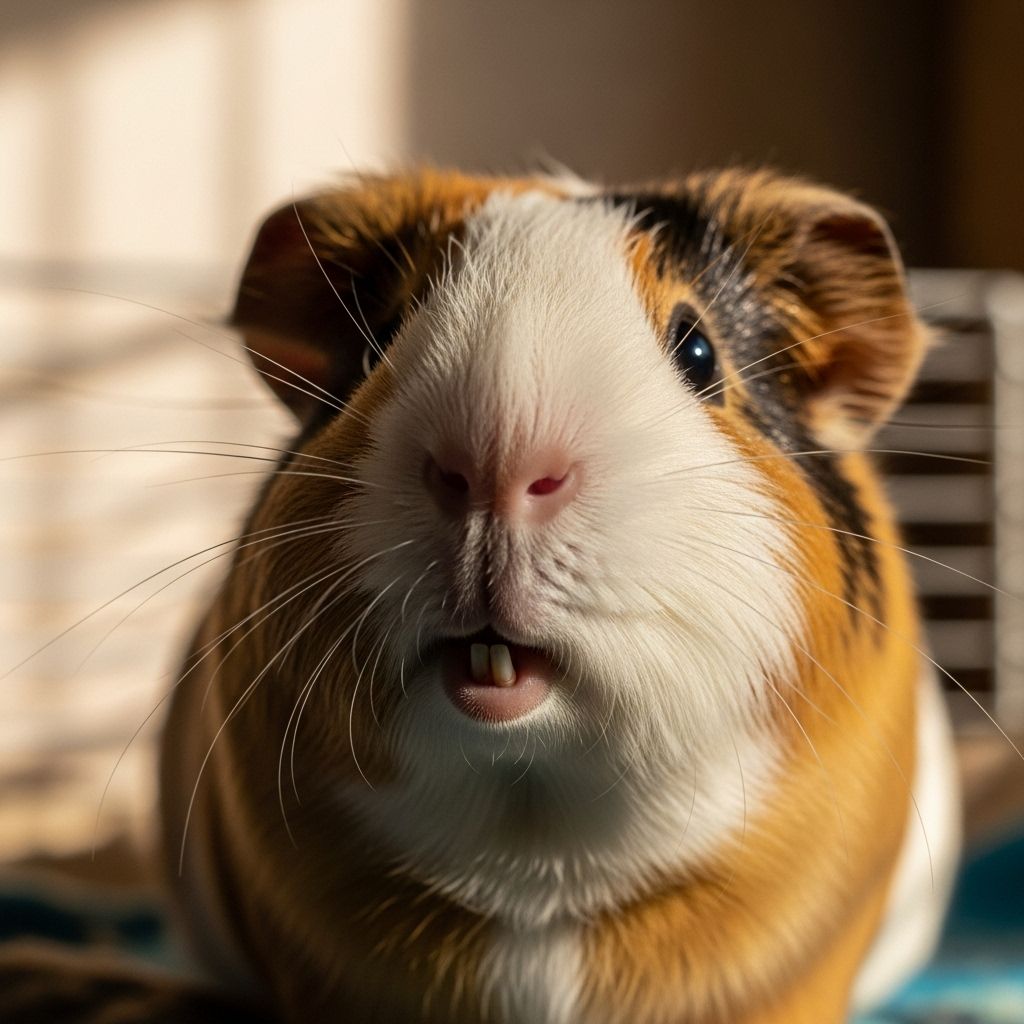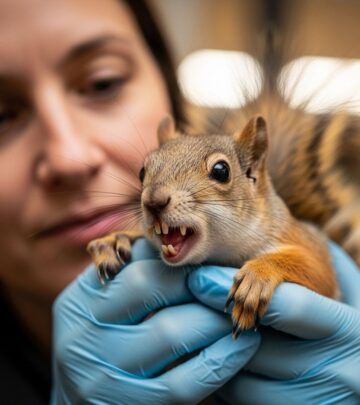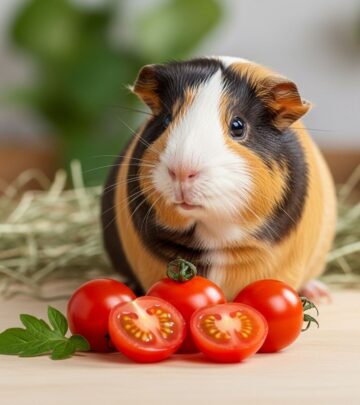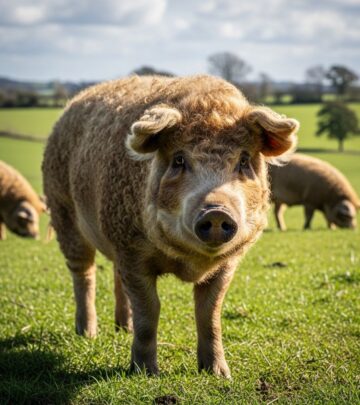Why Do Guinea Pigs Bite? Understanding Causes and Solutions
Spotting subtle warnings early helps build calm and confidence in your pet’s routine.

Guinea pigs are known for their gentle nature and sweet personalities, but despite their generally mild temperament, there are times when a guinea pig may bite. Understanding why guinea pigs exhibit this behavior is crucial for responsible pet ownership. This article explores the main reasons behind biting, how to handle and prevent it, and what actions to take if biting becomes a problem.
Are Guinea Pigs Naturally Aggressive?
Guinea pigs are not naturally aggressive—they are typically social, gentle pets that rely more on fleeing than fighting. However, biting is a form of communication they may use when feeling scared, threatened, or uncomfortable. It’s important to interpret their biting in context and understand that it rarely stems from true aggression.
Main Reasons Guinea Pigs May Bite
Though every guinea pig is an individual, there are several common reasons why biting may occur. Understanding these can help owners identify problems and create a happier environment for their pets.
- Fear and Stress: Guinea pigs are prey animals. If startled, handled too roughly, or introduced to a new environment, they may bite defensively.
- Pain or Illness: A sudden onset of biting can be a sign your pet is unwell or experiencing discomfort. This can include dental pain, bloat, mites, or injuries.
- Natural Instincts: Sometimes, nipping is a byproduct of curiosity (guinea pigs use their mouths to explore) or due to their need to chew.
- Hunger or Food-Related Behavior: Guinea pigs may nip to get your attention when hungry or to grab food directly from your hand if you’re not careful.
- Lack of Socialization: Guinea pigs not appropriately socialized with humans or other pigs may use biting to express boundaries or discomfort.
- Inadequate Space or Boredom: In cramped or unstimulating environments, guinea pigs may bite their cage, objects, or even each other out of frustration.
- Territorial or Dominant Behavior: This occurs more frequently in groups, especially among males or when introducing new guinea pigs to each other.
- Mistaking Fingers for Food: Sometimes, food scents or unfamiliar smells on hands can prompt accidental nips.
Recognizing the Type of Bite
Not all guinea pig bites are the same. Distinguishing between a gentle nip and a hard bite is key to understanding intent:
- Nips: Often exploratory, signaling curiosity, or a gentle warning. These rarely break the skin.
- Hard bites: Indicate fear, pain, or a strong need to communicate discomfort. These can hurt or even break the skin.
Common Situations When Guinea Pigs Bite
Guinea pigs might bite under certain circumstances. Recognizing these helps prevent misunderstandings and improves handling techniques:
- During Sudden Handling or Startling: Quick grabs, loud noises, or sudden movements can frighten guinea pigs and provoke biting.
- When Feeling Unwell: If your pet displays irritability, loss of appetite, or changes in behavior along with biting, consult a veterinarian.
- Carrying for Too Long: Being held for extended periods (especially without full-body support) can make a guinea pig feel insecure and resort to nipping.
- When Needing to Go Potty: Guinea pigs may nip to signal their discomfort or need to return to their cage.
- Petting Against Their Fur: Some guinea pigs dislike being petted in certain areas or against the natural direction of their fur and may nip to object.
- Handling While Eating or Sleeping: Interrupting these activities can lead to startled reactions, including biting.
Table: Underlying Causes and Solutions for Guinea Pig Biting
| Cause | Recommended Solution |
|---|---|
| Pain or Illness | Consult a veterinarian, especially if biting is sudden or accompanied by physical symptoms. |
| Fear or Stress | Approach your guinea pig calmly, avoid sudden movements, and limit handling during acclimatization. |
| Hunger | Maintain a reliable feeding schedule and always provide fresh hay. |
| Lack of Socialization | Gradually increase gentle interactions and positive experiences with humans and other guinea pigs. |
| Boredom or Inadequate Space | Offer a large cage (7–10 sq ft minimum for one), toys, chew items, and daily floor time. |
| Dominance or Territory | Monitor introductions, provide separate hideouts and feeding areas, and avoid overcrowding. |
| Mistaking Fingers for Food | Wash hands before handling; avoid feeding treats by hand if biting is a recurring issue. |
How to Prevent Guinea Pig Biting
Most biting is avoidable with proper care and attention. Here are practical prevention strategies:
- Provide Adequate Space: Ensure each guinea pig has enough room to roam and hide. A spacious cage reduces stress and aggression.
- Enrich the Environment: Toys, tunnels, hay racks, and safe chew items keep guinea pigs stimulated and focused on appropriate activities.
- Gentle Socialization: Spend time with your guinea pig daily, speaking softly and using slow movements. Let them come to you at their own pace.
- Consistent Routine: Guinea pigs thrive on consistency. Feed them at the same times every day and maintain regular cleaning and handling schedules.
- Respect Boundaries: Watch for signs of discomfort (teeth chattering, squealing, freezing, or fidgeting) and respond accordingly.
- Proper Handling: Always support a guinea pig’s body and avoid squeezing. Use two hands, and be mindful of their reactions during handling.
- Frequent Health Checks: Monitor for signs of illness or pain, such as patchy fur, reduced appetite, limping, excessive scratching, or lethargy.
- Wash Hands Before Handling: Avoid unfamiliar or food-like smells that may trigger accidental nips.
- Separate Aggressive Individuals: If fighting persists among guinea pigs, house them separately with their own supplies.
Signs a Guinea Pig Is About to Bite
Guinea pigs display body language that can serve as an early warning. Look out for these signs and give them space if you see:
- Teeth Chattering or grinding (a clear warning of annoyance)
- Raising Their Head or Fluffing Fur
- Squealing or Loud Vocalizing
- Sudden Freezing or Attempting to Flee
- Kicking or Struggling in Your Hands
What to Do If Your Guinea Pig Bites You
If you are bitten, stay calm and avoid reacting with sudden movements or loud noises, as this can frighten your pet further. Here’s what to do:
- Gently Return the Guinea Pig to Its Cage: Let your pet calm down in its familiar space.
- Clean Any Wounds: Wash a bite with soapy water. Seek medical attention for deep wounds or signs of infection.
- Observe Behavior: Monitor your guinea pig for signs of pain, illness, or ongoing agitation and consult a vet if needed.
- Consider What Triggered the Bite: Reflect on the situation to prevent repeat incidents.
Guinea Pigs Biting Each Other
Sometimes, guinea pigs will bite their cage mates. This is especially common among males or when two unfamiliar guinea pigs meet. The causes usually involve:
- Dominance or Territory Disputes: Biting may be a way to establish hierarchy or claim resources.
- Overcrowding: Too many guinea pigs in a small space increase competition and stress.
- Lack of Hiding Spaces: Providing multiple hideouts reduces territorial competition.
If biting persists, separate the guinea pigs and gradually reintroduce them in neutral territory, supervising closely. Ensure each has separate feeding stations and spaces to retreat.
When to Seek Veterinary Attention
If your guinea pig’s behavior changes suddenly—especially if combined with lethargy, hair loss, limping, excessive scratching, blood, or bald patches—it may be suffering from a medical issue. Some potential causes include:
- Mites or Skin Infections: Look for excessive scratching or biting at the back.
- Bloat or Digestive Pain: Biting at the belly or sides with bloating should be addressed immediately by a veterinarian.
- Injuries or Dental Problems: Difficulty eating, favoring one side of the mouth, or bleeding are red flags requiring medical attention.
Myths About Guinea Pig Biting
- Myth: Guinea pigs bite for no reason.
- Fact: Guinea pigs always bite for a reason—pain, fear, misunderstanding, or unmet needs.
- Myth: Biting means a guinea pig is mean.
- Fact: Biting is a communication tool, not a sign of inherent aggression.
- Myth: Once a biter, always a biter.
- Fact: Most biting behaviors can be managed or eliminated through proper care and understanding.
Tips for Building Trust with Your Guinea Pig
- Let your guinea pig approach you rather than forcing interaction.
- Use treats and gentle petting to reinforce positive encounters.
- Speak softly and avoid sudden gestures.
- Spend time near their cage, reading or talking, to help them get used to your presence.
- Be patient—trust develops gradually.
Frequently Asked Questions (FAQs)
Why do guinea pigs nip rather than bite hard?
Nipping is how guinea pigs explore their environment or communicate discomfort or curiosity. It rarely indicates aggression, and young guinea pigs may outgrow the behavior as they mature.
Can guinea pig bites be dangerous?
Guinea pig bites are usually not dangerous, but like any bite, they can break skin and become infected. Always clean bites and monitor for signs of infection.
How can I tell if my guinea pig is about to bite?
Warning signs include teeth chattering, raised fur, squealing, freezing, or attempts to escape. If you see these, give your pet space to calm down.
Should I discipline my guinea pig if it bites?
Never punish a guinea pig for biting. They respond best to gentle, positive reinforcement, and punishment can increase their fear and worsen behavior.
What should I do if my guinea pig starts biting suddenly?
A sudden increase in biting often signals pain or illness. Check for injury, dental issues, or signs of sickness and contact a veterinarian if concerned.
Key Takeaways
- Biting in guinea pigs is usually a form of communication, not malice.
- Most biting can be prevented or reduced through proper care, housing, enrichment, and gentle socialization.
- Sudden or severe biting should be treated seriously and may require a vet visit.
- With patience and understanding, guinea pigs make affectionate, trusting companions.
References
- https://luftpets.com/blogs/news/guinea-pig-biting-cage
- https://www.youtube.com/watch?v=UiLVRqH4AkY
- https://www.kaytee.com/learn-care/small-animals/do-guinea-pigs-bite
- https://exoticdirect.co.uk/news/how-to-stop-guinea-pigs-from-fighting-and-biting/
- https://www.chewy.com/education/small-pet/guinea-pig/guinea-pig-behavior
- https://www.theguineapigforum.co.uk/threads/guinea-pig-suddenly-started-biting.192161/
Read full bio of Sneha Tete












